Today’s post is the second half of Tuesday’s, 9 Screenwriting Tips from Notting Hill. Notting Hill is a great romantic comedy to study because its plot is straightforward and its structure is solid.
It’s proof that simple can be successful, and that’s a great approach for amateur screenwriters to consider. Too often, when writers are trying to fulfill their screenwriting aspirations, they are overly ambitious and don’t take the time to master the basics.
If any of your fellow writers have accused you of trying to be “too clever” or have commented that your screenplay draft is “too gimmicky” then take a break and watch Notting Hill. You’ll see that simple stories told by compelling characters are still powerful, despite their lack of complexity.
And now onto the rest of the screenwriting tips:
Screenwriting Tip #5: Delay the Realization
This is a quick and easy tip to add humor to a scene. Let me explain via example. In Notting Hill, when Anna goes to Max’s house with Will, she meets Max, Bella and Will’s sister Honey. They immediately recognize her, and each of their distinct interactions with Anna adds to the humor. Finally, their friend Bernie arrives, late as usual, and everyone is waiting to see what Bernie’s reaction to meeting the mega-star Anna Scott will be.
However, Bernie doesn’t react at all…because he doesn’t realize it’s Anna. By delaying his realization and by subverting everyone’s expectation that Bernie would freak out, Richard Curtis added an extra element of humor to the standard “meet the friends” scene.
Anytime you have characters thinking or saying, “Bernie is so going to freak out about X,” try writing the scene with Bernie acting perfectly cool, and see if that adds to your comedy quotient. (I feel this works really well with “meet the parents” scenes too.)
Screenwriting Tip #6: Obstacles are born out of plot and character
If your two romantic leads didn’t have any difficulties keeping them apart, you wouldn’t have a screenplay. This actually holds true for ALL movies because every movie has the same backbone: main characters have to overcome a series of obstacles in order to reach their goals.
However, these obstacles can’t be random problems that crop up because you only have a sixty-page screenplay and need to find a way to extend your second act. The obstacles in your script have to arise organically from the plot and characters of your movie.
If we examine the obstacles that kept Will and Anna apart in Notting Hill, we’d see that screenwriter Richard Curtis followed this maxim to the letter. In the beginning of the movie, a few days after they have met, Anna invites Will to stop by her hotel.
Bearing a simple bouquet of flowers, Will arrives–only to find that her suite is filled with reporters wanting to interview her about her forthcoming movie. Embarrassed and confused, Will poses as a reporter and when he gets some face time with Anna, continues the ruse, as her head PR guy pops in and out of her room.
The PR guy prevents Will from having a real, heartfelt conversation with Anna. His presence as well as the whole press junket conceit formed a temporary set of obstacles, which briefly stalled Will and Anna’s developing relationship. The key though is that the PR guy and the congregation of the press were figures you would expect Anna to have in her life. Their presence created an obstacle which had the stamp of authenticity.
You would also expect Anna to have a glamorous, A-lister actor boyfriend…and in fact, one surprises us around the middle of the movie. While the PR guy temporarily stalled Anna and Will’s relationship, Alec Baldwin’s brief cameo brought their budding romance to a screeching halt.
All hope appears to be lost, and afterwards, Will even goes on a series of dates, although it’s clear his heart is still smitten by the American actress. Again, kudos to Curtis for introducing an ex-boyfriend who seems like a legitimate parcel of Anna’s emotional baggage. But it’s towards the end of the second act where Curtis’s penchant for authentic obstacles really shines.
First, he brings Anna and Will back together after nude photos of her are published in all the British tabloids. Anna says the pictures were taken when she was young, and desperate for money. She’s thoroughly embarrassed and seeks Will’s house with the blue door as a safe haven.
After treating him so shabbily before, the emergence of the pictures is the perfect impetus to bring them back together. It has the right amount of urgency and gravity, and it doesn’t seem at all like Anna is dropping into Will’s life simply because the story needs for them to meet again. This intense situation also creates a perfect bonding opportunity for the two love birds.
However, their domestic bliss is ruined when the entire British press descends upon Notting Hill and camps out in front of Will’s house. They snap pictures of everyone–Anna, Will (and Spike)–all in a state of semi-undress. Anna is furious with Will and says she will regret this forever. She came to him for safety, and he has now made her predicament even worse.
Every time the press does a story on her, they can pull up these photos, and she can never outlive them. Now, Will and Anna have been split apart for good. The driving forces in this break-up, the press and Anna’s tortured relationship with them, is just the sort of conflict you’d expect a civilian to have with a celebrity girlfriend.
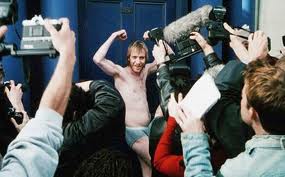
Spike, an unusual rom-com sidekick
Curtis skillfully built up–and broke down–Anna and Will’s relationship by using the British tabloid reporters as his agents of change. It seems so simple, almost obvious, but you’d be surprised by the number of screenwriters who who wouldn’t have mined Anna and Will’s professions and personalities to look for obstacles to tear them apart.
In the best screenplays, like Notting Hill, EVERY obstacle can be tied to character or plot. If you’re looking for obstacles to add to your second act, look no further than your main character’s professional, social and familial environment. You’ll see that everything you need is already there–and you don’t need to bring in some outside random element to wreak havoc for your heroine.
Screenwriting Tip #7: Great characters are vulnerable
In real life, people find it inordinately difficult to open up and be vulnerable to another person. This is one reason why moments of vulnerability are so emotionally satisfying because on-screen characters are having the courage to behave in a way we, ourselves, would not.
For whatever reason, this kind of emotional courage has a deeper resonance with an audience than the courage to face physical harm, and every screenplay is all the more richer if your characters demonstrate genuine emotional vulnerability. I think this characteristic is one which elevates a decent movie into a blockbuster.
In Notting Hill, Anna’s character makes herself endearingly vulnerable on more than one occasion. You’re probably already familiar with her “I’m just a girl, standing in front of a boy” speech which is a classic rom-com moment.
But there’s another less famous moment, earlier on in the movie, where Anna makes herself vulnerable to William, showing that any woman, no matter how blessed, has insecurities. It’s a beautiful scene that had the potential to be cheesy, but thanks to Curtis’s skilled writing and Roberts’s skilled acting, has the right balance of sweetness and sentimentality.
These are the kinds of scenes that make your characters appear three-dimensional, so it’s worthwhile to study this one:
ANNA
Rita Hayworth used to say–‘they go to bed with Gilda–they wake up with me.’ Do you feel that?
WILLIAM
Who was Gilda?
ANNA
Her most famous part–men went to bed with the dream–and they didn’t like it when they woke up with the reality–do you feel that way with me?
WILLIAM
(pause)
You’re lovelier this morning than you have ever been.
ANNA
(very touched)
Oh.
Screenwriting Tip #8: Interruptions Are Welcome
When two of your characters are having a pivotal, relationship-defining conversation, ratchet up the tension by interrupting them. You want to keep your audience hooked to your story. If one of your characters makes a huge revelation to another character, everyone in the audience wants to know how the second character will react.
They will watch with baited breath…or if they’re reading your script, they’ll be madly flipping through your screenplay pages. Without knowing what the fallout of the revelation is, your audience won’t be able to experience emotional closure.
By delaying that emotional closure, you’re keeping your audience in a state of suspense, and they won’t be able to disengage from your story. Notting Hill uses this method at many junctures in the movie.
In the first one, Will meets Anna for the first time, as she browses travel guides in his bookshop. Clearly in awe of her, he’s exchanged banter with her, and we, the audience, want to know if this banter is going to turn into something more.
We’re in a tiny bit of suspense–which gets prolonged as Will and Anna’s interaction is interrupted by the Cadogan Guide to Bali thief described in screenwriting tip #1 from this post. It’s a tiny delay, but when Will and Anna begin conversing again, it makes watching their repartee all the more satisfying.
Curtis employs this method again when Will arrives at Anna’s suite at the Ritz as a suitor, but ends up posing as a reporter for Horse and Hound. As described in screenwriting tip #6, Anna and Will’s relationship gets temporarily stalled as they are interrupted by her PR guy who enters and leaves her room several times. This added a level of suspense and tension to what would have just been a humorous scene.
Interruptions play a key role later on in Curtis’s screenplay at a much more crucial moment. This time, after treating Will shabbily–twice–Anna swoops back into London, and back into his life.
She’s arrived at his travel bookshop, bearing a large wrapped gift, and says “I actually had it in my apartment in New York and just thought you’d…but, when it came to it, I didn’t know how to call you…having behaved so…badly, twice. So it’s been just sitting in the hotel. But then…you came, so I figured…the thing is…the thing is…”
Only the most stone-hearted of you won’t be wondering what “the thing is.” If you had invested at all in Will’s happiness, you’d be on pins and needles at this moment. And there’s no immediate relief in sight, because of course, Anna and Will are interrupted by an annoying customer, who can’t grasp that Will’s travel bookshop doesn’t sell novels.
Will banishes him from the shop immediately, and Anna resumes her confession. “The thing is,” she says, “I have to go away today but I wondered, if I didn’t, whether you might let me see you a bit…or, a lot maybe…see if you could…like me again.”
Yowza! This is one hell of an emotional bombshell. Although we want to see the two end up together, after the way Anna has treated Will, it’s completely understandable that he will politely decline.
We won’t find out his response right away however, because this pivotal moment is interrupted by Will’s assistant, informing Will that his mother is on the phone.
MARTIN
Excuse me–it’s your mother on the phone.
WILLIAM
Can you tell her I’ll ring her back?
MARTIN
I actually tried that tack–but she said you said that before and it’s been twenty-four hours, and her foot that was purple is now a sort of blackish color…
WILLIAM
Okay–perfect timing as ever—hold the fort for a second will you, Martin?
And Martin does hold the fort, very awkwardly, as he confuses Anna with another actress, Demi Moore. And then, only then, when Will returns, does he render his verdict.
You may think that these interruptions are silly and somewhat contrived. However, they really do work to keep your audience hooked to your story developments. Even the smallest delay in emotional closure can add a subtle layer of story tension that keeps “tried and true” story beats more fresh.
Make sure though that your interruptions have some relevance to the story you’re telling. They can’t be completely random. Both the annoying customer and Will’s mother were elements that had been introduced prior to this particular scene, so they didn’t seem like they were appearing out of the blue.
Screenwriting Tip #9: Your grand finale needs to be witnessed
The endings of romantic comedies are shockingly similar: one of the love birds clears up any remaining misunderstandings and makes a grand declaration of love, and then both your hero and heroine live happily ever after.
This plot beat has played out too many times at an airport, but increasing security after 9-11 (plus the overly enthusiastic TSA) has basically kicked this scene to the curb.
While you want to avoid airport finales, there’s one screenplay trick that can’t be used too many times: make sure there’s an audience for the declaration of love. This is an easy way to up your story stakes.
Let’s say for example, your hero is begging the forgiveness of his leading lady at a small park. Her rejection would devastate him. What if the park were full of hipsters and high-schoolers attending a free rock concert? This built-in audience increases your story stakes, because now your hero might not only lose the girl, but his rejection will also be witnessed by hundreds of strangers which increases his potential for humiliation.
By putting himself out there–really out there, in front of a live audience and a band–your hero is opening himself up to an even larger risk. That may be the price he has to pay, especially if he had embarrassed his lady-love earlier on in your screenplay.
In Notting Hill, Will politely declines Anna’s request to see him again, even though she makes herself extraordinarily vulnerable by saying she’s “just a girl, standing in front of a boy, asking him to love her.” She departs, leaving behind her gift for Will, a Chagall original.
After this sound rejection, Will has to make amends to win Anna back–and he does so, by declaring his change of heart at a major press conference, attended by a horde of reporters who will fill the British tabloids with every minute detail. The presence of the reporters added drama, suspense, and humor to what could have been a trite scene.
Richard Curtis uses this technique again at the end of Love, Actually, when Jamie declares his love to Aurelia in mangled Portuguese in front of her family at a crowded restaurant, which you can see from this movie clip on YouTube.
Of course, your screenplay finale can’t just be filled with random strangers so you can amplify the potential for your hero’s humiliation. The audience has to seem like a natural part of the ambiance.
In Notting Hill, the British press played a key role in bringing Anna and Will together–and also tearing them apart. So it seemed only fitting that the press would play a part at the end too. One way to include an audience naturally is to have your finale take place at a location that’s meaningful to one or both of your leads, and a place where you’d expect to see a lot of people. Places like an ice skating rink, beach, fancy restaurant, convention center, etc.
Final thoughts on Notting Hill
Romantic comedies have a reputation for being unoriginal and uninspiring. I think that’s mostly because the three-acts in a romantic comedy have predefined goals: boy meets girl; boy loses girl; boy gets girl…and vice versa.
It’s difficult to put a fresh spin on this traditional progression, but it’s by no means impossible. A romantic comedy will never be trite if your set pieces and romantic interludes arise out of the quirks of your characters, and the obstacles in your rom-com organically evolve from your plot.
Sacrificing character on the altar of plot is a pitfall that every genre–whether drama, comedy or something in-between–faces, but it’s an issue the romantic comedy writer has to be especially vigilant about since the plot beats and conventions of a rom-com are so familiar to its target audience.
Even though the genre is frowned upon among some screenwriting circles, it’s much harder to write a good rom-com than a good comedy or dramedy. If you’re in that group that “tsks” at the lowly rom-com, I urge you to try to write one. Your respect for likes of Aline Brosh McKenna and Marc Lawrence will grow.
All romantic comedy writers, take note. Date Night in America is counting on YOU!
Notting Hill Gate by Lali Masriera
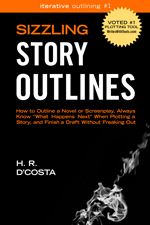
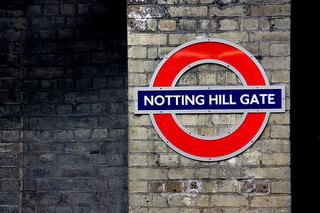







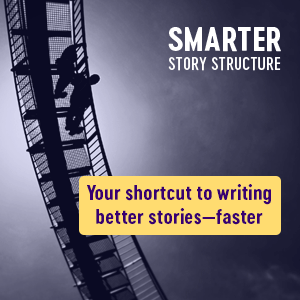

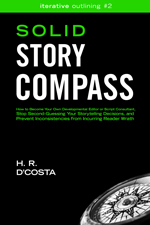
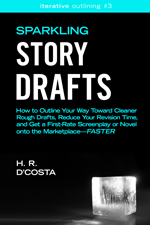
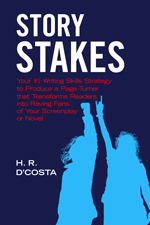
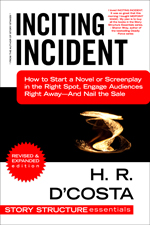
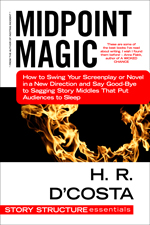
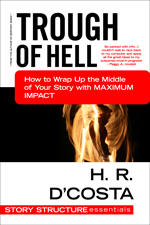

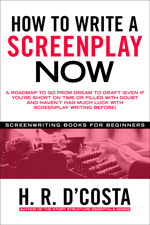
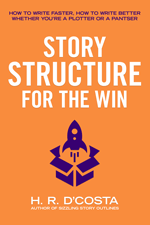

Comments on this entry are closed.
I have been working on the outline for a rom-com, for quite a few months, with the help of a hollywood screenwriter. He is fairly confident we have something very new, But my god is it difficult to keep it simple and make it all happen with believable reversals in the 3 acts, and expose their worlds, and to make the coups de foudre believable. The first kiss in NH is what most people don’t believe in. I do. It has happened to me 3 times, and I married the most powerful one.
This has been very useful, thank you.
Hi Giuliano,
Thank you for visiting Scribe Meets World! I apologize it has taken me so long to respond to your comment. You are absolutely correct — it is extremely difficult to make a romantic comedy believable. Because of its familiar plot, it’s easy for everything to come across as contrived — especially the coup de foudre.
You wrote, “it has happened to me three time, and I married the most powerful one.” This is a very intriguing statement, and I hope part of your real-life experience finds its way into your screenplay. That kind of authenticity will elevate your rom-com above the others. Good luck!
If there are any romantic comedies you’d like to see specifically analyzed on this site, please let me know 🙂